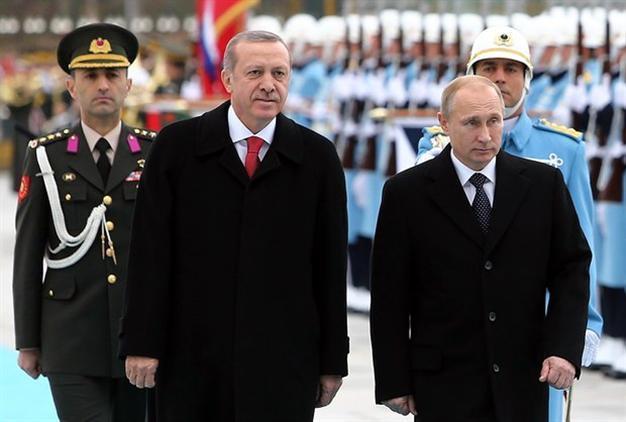Erdoğan visits Moscow amid high Syria tensions
Sevil Erkuş - ANKARA

AFP photo
Turkish President Recep Tayyip Erdoğan has met with his Russian counterpart, Vladimir Putin, at a time when Moscow is boosting its support for the Syrian government, much to the chagrin of Ankara.However, Syria is not the sole issue on the leaders’ agenda, with a pipeline project being another hot matter.
"The solution to the refugee crisis cannot be achieved by closing the borders or leaving those people to die in the sea," Erdoğan said. "It can only be achieved by transforming their countries into habitable places where the refugees can live."
Reiterating that Turkey was hosting more than two million refugees, mostly from war-torn Syria, he added: "I want to recall the Russian writer Tolstoy's message, which says the most important act in life is kindness."
Putin was joined by Erdoğan, as well as Palestinian President Mahmoud Abbas, at the ceremonial opening of the Russian capital’s new main mosque on Sept. 23.
"Muslim opinion leaders always contribute to the development of peace and common sense against extremism in Russia," Putin said in his speech, condemning the Islamic State of Iraq and the Levant (ISIL) group. "Their ideology is based on lies and blatant perversion of Islam," he added, quoted by the state-owned Sputnik news agency. "Attempts are being made to cynically exploit religious beliefs for political goals," he added,
An estimated 2 million Muslims now live in Moscow, which has seen an influx of people from the North Caucasus republics of southern Russia, Azerbaijan and the former Soviet states in Central Asia.
The new mosque - built on the site of a smaller, more than 100-year-old mosque destroyed in 2011 - can accommodate 10,000 worshippers, but it is still one of only six mosques in the city.
Meanwhile, Turkish Prime Minister Ahmet Davutoğlu expressed concern over Russia’s increasing military build-up in neighboring Syria, calling it “very dangerous,” and noting the issue will be on the agenda for Erdoğan in Moscow.
Davutoğlu said Russia’s support for Syria had now become more visible.
“They have taken [it] into the field. This is very dangerous. Therefore, we watch with deep concern,” the prime minister said in a televised interview late Sept. 21.
Russia, a strong backer of Syrian President Bashar al-Assad, has increased its military build-up in the country as the embattled leader faces setbacks on the battlefield at the hands of Islamic State of Iraq and the Levant (ISIL) militants and other jihadist factions.
Russia has deployed 28 combat planes in Syria, Agence France-Presse has said, quoting U.S. officials.
According to the officials, Russia has sent 12 SU-24 attack aircraft, 12 SU-25 ground attack aircraft and four Flanker fighter jets.
Turkey is a part of the coalition against ISIL, which is bombing jihadist targets on Syrian soil, and has opened its İncirlik base to U.S. use for the operations.
Davutoğlu said Erdoğan would raise issues regarding Syria during talks with Putin.
“Inshallah Russia will not insist on ways and methods that will increase the tension,” he said.
The international community and the United Nations Security Council’s permanent members should gather and take steps for a political solution in Syria, the prime minister noted.
Al-Assad is the “main [one] responsible and is [to] blame for the dangerous escalation which caused the problem to deepen,” Davutoğlu said. However, he also placed blame on “the international community, which merely contented themselves monitoring the entire process by making Syria a mutual power game.”
The Syrian issue would be the essence of his speech at the upcoming U.N. General Assembly meeting, he added.
Erdoğan’s visit to Moscow comes after Foreign Minister Feridun Sinirlioğlu’s talks in Sochi with Russian Foreign Minister Sergei Lavrov last week. Talks once more have brought differences to light regarding Ankara and Moscow’s perspectives on al-Assad’s role in Syria.
Ankara has argued that al-Assad can have no role in Syria’s future or in the political transition period.
However, U.S. Secretary of State John Kerry recently stressed that the timing of al-Assad’s departure should be decided through negotiations.
“It doesn’t have to be on day one or month one. There is a process by which all the parties have to come together and reach an understanding of how this can best be achieved,” he said Sept. 18 after talks with British Foreign Secretary Philip Hammond.
Meanwhile, Sinirlioğlu has continued phone conversations with colleagues regarding the Syrian crisis and worsening migration crisis. He discussed the issue with Hammond and the European Union’s enlargement commissioner, Johannes Hahn, on Sept. 21.
They also discussed developments in the Middle East, particularly Syria and Libya, according to diplomatic sources.
The Turkish Stream pipeline project, which was set to take more Russian gas to Turkey via a pipeline crossing the Black Sea but has now been put on halt, will be discussed in Moscow, according to officials.
“Mutual ties, especially in energy, will be discussed at the meeting,” Reuters quoted a presidency source as saying. The agency also quoted an official who said interim Energy Minister Ali Rıza Alaboyun would accompany Erdoğan during the visit.
“We are talking about an 11.4 billion-euro project,” said the official.
















